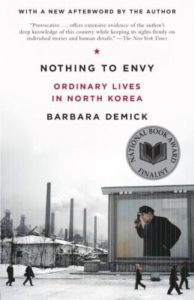Book Review
Nothing to Envy
Rating:

I would not have read this book had it not been a selection of my book group. Non-fiction not being my thing, I was less that gracious as I read it, wondering the whole while what in the world my group would discuss. I worried that once we got past the horror of life in North Korea and the remarkable strength of downtrodden women, there wasn’t much to keep the evening going.
I was very wrong. For starters, we had appetizers. The meeting’s host bought snack food at a Korean grocery, and the discussion leader brought Korean pears. The pears, which play a part in the story, seemed more an apple-pear hybrid, and were truly delicious. The snack food didn’t go over quite as well, largely because of its smell. But it spawned fun talk before we got down to the book itself.
This book is a marvel. The title, Nothing to Envy, comes from a propaganda phrase habitually drummed into North Koreans: “We have nothing to envy in the world.” The book tells the stories of six North Koreans who, each in his or her own way, escaped the country and were able to tell what life there is like.
Barbara Demick became interested in this subject when she was a reporter for the L.A. Times, stationed in South Korea. She interviewed more than 100 people, that many in part to corroborate facts in the stories of the six she chose to profile. She visited North Korea eight times in all, each time shadowed by not one North Korean handler, but two – the second to make sure that the first remained tight-lipped. She wasn’t allowed to interview North Koreans in North Korea; the shutdown of communications was total. So she talked with defectors.
Of this book’s strengths, even beyond the heart in the stories told, is the manner of the telling. The author moves back and forth between her subjects with a skill rivaling that of a master novelist. I can’t begin to imagine juggling so many facts and then putting them together in such a consummately readable way, all the while remaining objective.
Nothing to Envy is not a long book. Nor, though, is it an easy read. But it is riveting. Like The Underground Railroad, it is an important book. Prior to reading it, I knew few details about life for the average North Korean. Now I do. These details remain vivid in my mind even now. I fear this will help me understand more of what may be currently about to erupt between North Korea and the rest of the world.